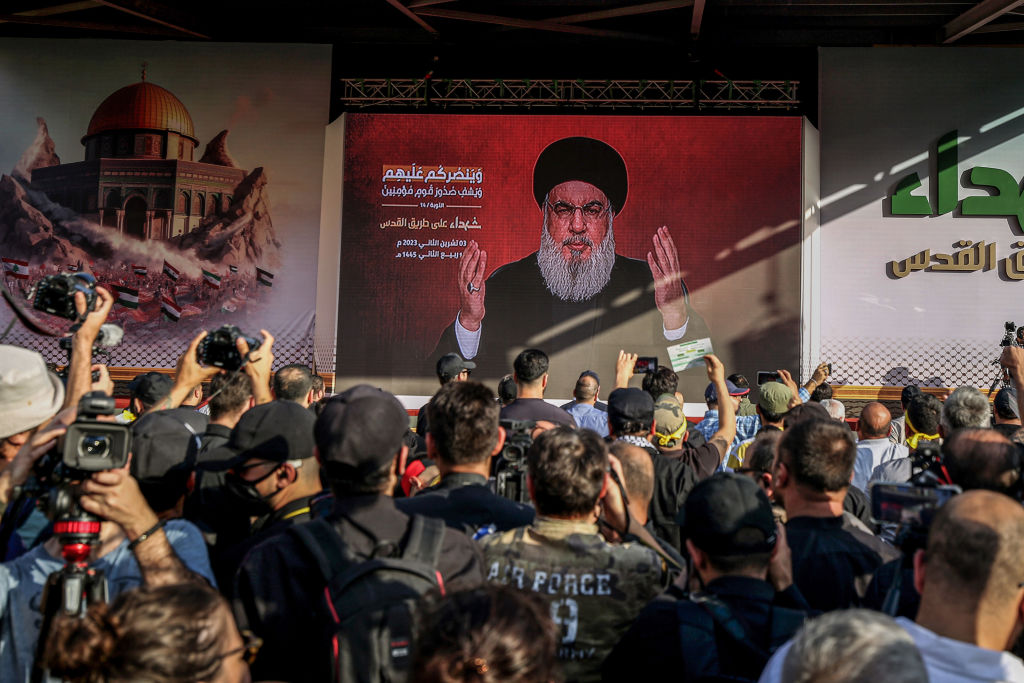In an incendiary speech, Sayyed Hassan Nasrallah, the leader of the Lebanese militant group Hezbollah, celebrated Hamas’s Oct. 7 attack, while falling short of announcing a full-scale war against Israel.
In the run-up to the speech, many in Lebanon and neighboring Israel feared that Nasrallah, one of the most key figures in the network of Iranian-backed militias, would announce a full-scale war with Israel. Some schools were reportedly canceled and many Lebanese civilians were ready to flee the country if war were to break out. Hezbollah is a more powerful and sophisticated militant group than Hamas, with tens of thousands of fighters, an arsenal of more than 100,000 rockets, and a small arsenal of precision guided munitions that could strike targets deep inside Israel.
[time-brightcove not-tgx=”true”]
But in Nasrallah’s first speech following Hamas’s Oct. 7 attack, he said that Hezbollah’s decision to escalate further is contingent on whether Israel launches a larger attack on Hezbollah in Lebanon and escalation in the Gaza Strip.
“It’s a signal to Israelis that they’re not trying to do anything large scale at that point,” says Aaron Y. Zelin, who studies jihadist movements at The Washington Institute for Near East Policy. “From an Israeli perspective, they’re probably sighing some relief, even though the northern border has heated up more than it has since 2006.”
Tore Refslund Hamming, an expert in Islamic militants at the International Centre for the Study of Radicalization at King’s College London, says that Nasrallah was trying to strike a fine line between emphasizing Hezbollah’s response to the Oct. 7 attacks as “not too weak, but also not too aggressive.” “I don’t think he wants to go into a full war with Israel at this stage,” says Hamming.
Even so, Nasrallah warned repeatedly that “all options are on the table on the Lebanese front,” and warned that there was a realistic chance of a “wide war” breaking out between Israel and Hezbollah. So far, the militant group has fired rockets and drones at Israeli military positions and towns in northern Israel, as well as exchanging fire with Israeli forces along the Lebanon-Israel border. These attacks, Nasrallah said, have forced Israel to divert resources and troops to Israel’s northern border that Israel would otherwise have directed to Gaza.
Nasrallah also tried to distance Hezbollah from Hamas’s attacks on Israel, saying that the attack was “100% Palestinian.” He added that the attacks, which left more than 1,400 dead in Israel, were not planned alongside Hamas’s allies in the region or even other militant groups in Gaza. “We were surprised just like everyone else,” he said.
Nasrallah criticized the U.S. for its role in supporting Israel. “America is completely responsible for the current war in Gaza,” Nasrallah said. “It must be punished for what it is doing against the people of our region,” he said. He praised the militant groups in Iraq and Syria that have targeted U.S. military bases at least 27 times since Oct. 7, and threatened the U.S. ships that have arrived in the region, which include two aircraft carriers. “I tell you with all sincerity, we have prepared well for your fleets, with which you are threatening us,” Nasrallah said.
Both U.S. and Israeli officials have reportedly warned Hezbollah specifically about the consequences of further escalation. President Biden has said repeatedly in the days after the attack that his message to Iran and Hezbollah is simple: “Don’t.”

